临终关怀英文精品介绍
- 格式:ppt
- 大小:8.00 MB
- 文档页数:18
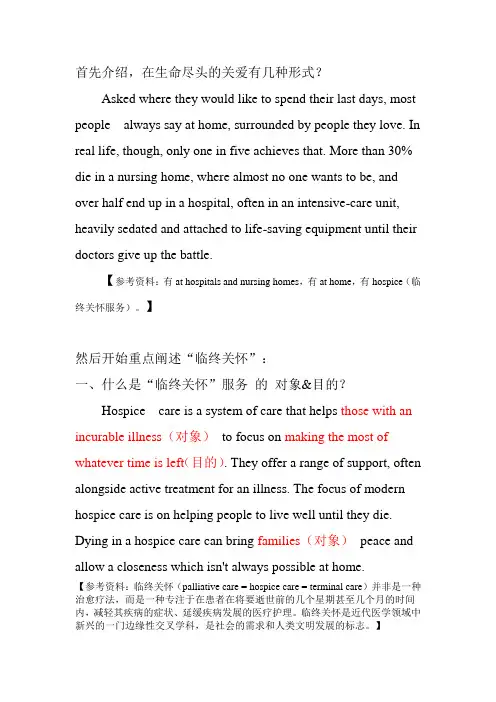
首先介绍,在生命尽头的关爱有几种形式?Asked where they would like to spend their last days, most people always say at home, surrounded by people they love. In real life, though, only one in five achieves that. More than 30% die in a nursing home, where almost no one wants to be, and over half end up in a hospital, often in an intensive-care unit, heavily sedated and attached to life-saving equipment until their doctors give up the battle.【参考资料:有at hospitals and nursing homes,有at home,有hospice(临终关怀服务)。
】然后开始重点阐述“临终关怀”:一、什么是“临终关怀”服务的对象&目的?Hospice care is a system of care that helps those with an incurable illness(对象)to focus on making the most of whatever time is left(目的). They offer a range of support, often alongside active treatment for an illness. The focus of modern hospice care is on helping people to live well until they die. Dying in a hospice care can bring families(对象)peace and allow a closeness which isn't always possible at home.【参考资料:临终关怀(palliative care = hospice care = terminal care)并非是一种治愈疗法,而是一种专注于在患者在将要逝世前的几个星期甚至几个月的时间内,减轻其疾病的症状、延缓疾病发展的医疗护理。

Hospice care,a specialized form of care for individuals facing terminal illness, focuses on providing comfort and support to both the patient and their family.This type of care is designed to improve the quality of life for those who are nearing the end of their journey,ensuring that their final days are as peaceful and dignified as possible.The Importance of Hospice CareHospice care is essential for several reasons.Firstly,it addresses the physical,emotional, and spiritual needs of patients,which are often overlooked in traditional healthcare settings.By focusing on palliative care rather than curative treatments,hospice care aims to manage pain and other symptoms,allowing patients to live as comfortably as possible.The Multidisciplinary ApproachHospice care is delivered by a multidisciplinary team that may include physicians,nurses, social workers,chaplains,and volunteers.This team approach ensures that all aspects of the patients care are considered and that the patients wishes are respected.The team works closely with the patient and their family to create a personalized care plan that addresses their unique needs and preferences.Emotional and Spiritual SupportOne of the key components of hospice care is the emotional and spiritual support provided to patients and their families.Grief counselors and chaplains are often part of the team,offering guidance and comfort during this challenging time.They help patients and families navigate the complex emotions that accompany a terminal diagnosis and provide support as they prepare for the end of life.Palliative Care and Symptom ManagementPalliative care is a central aspect of hospice care.It involves the use of medications and therapies to manage symptoms such as pain,shortness of breath,nausea,and anxiety.The goal is to ensure that the patients physical discomfort is minimized,allowing them to focus on the emotional and relational aspects of their remaining time. Bereavement SupportAfter the patients passing,hospice care does not end.Many hospice programs offer bereavement support to the family,providing a safe space for them to process their grief and loss.This support can take the form of counseling sessions,support groups,ormemorial services,helping the family to heal and find closure.The Role of Family and FriendsIn hospice care,the role of family and friends is invaluable.They provide emotional support and companionship to the patient,often participating in care activities and decisionmaking processes.Hospice staff educate and support family members, empowering them to provide care and comfort to their loved one.Bridging the Gap Between Life and DeathHospice care bridges the gap between life and death,offering a compassionate and dignified approach to endoflife care.It recognizes the importance of living each day to the fullest,even when faced with a terminal diagnosis.By focusing on quality of life, hospice care allows patients to spend their remaining time in a familiar and comfortable environment,surrounded by those they love.ConclusionHospice care is a vital service for those facing terminal illness,providing comprehensive support that addresses the physical,emotional,and spiritual needs of patients and their families.It is a testament to the human capacity for compassion and the importance of dignity in the face of lifes inevitable end.Through the provision of hospice care,we can ensure that every individuals final chapter is filled with love,comfort,and respect.。

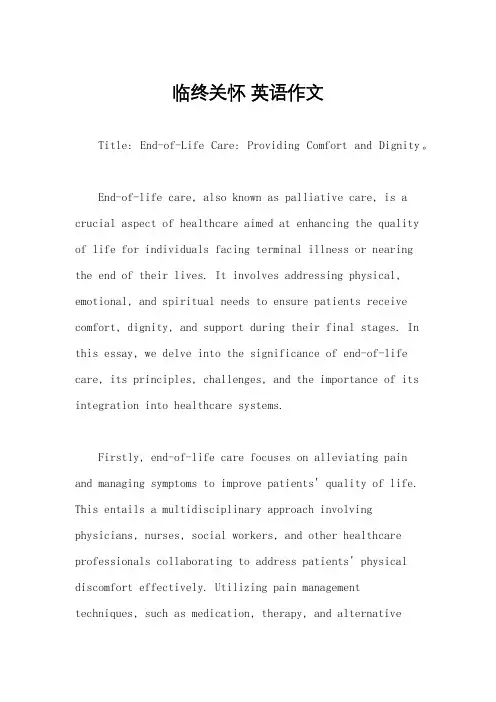
临终关怀英语作文Title: End-of-Life Care: Providing Comfort and Dignity。
End-of-life care, also known as palliative care, is a crucial aspect of healthcare aimed at enhancing the quality of life for individuals facing terminal illness or nearing the end of their lives. It involves addressing physical, emotional, and spiritual needs to ensure patients receive comfort, dignity, and support during their final stages. In this essay, we delve into the significance of end-of-life care, its principles, challenges, and the importance of its integration into healthcare systems.Firstly, end-of-life care focuses on alleviating pain and managing symptoms to improve patients' quality of life. This entails a multidisciplinary approach involving physicians, nurses, social workers, and other healthcare professionals collaborating to address patients' physical discomfort effectively. Utilizing pain management techniques, such as medication, therapy, and alternativetreatments, is pivotal in promoting comfort and minimizing suffering.Moreover, end-of-life care places considerable emphasis on addressing patients' emotional and psychological well-being. Terminal illness often evokes a range of complex emotions, including fear, anxiety, depression, and grief, not only in patients but also in their families and caregivers. Therefore, providing psychological support through counseling, therapy, and spiritual care can help individuals cope with their emotions, find meaning, and achieve a sense of peace during this challenging period.Respecting patients' autonomy and dignity is another fundamental principle of end-of-life care. Healthcare providers should engage patients in shared decision-making processes, respecting their preferences, values, and wishes regarding their treatment and end-of-life choices. This may involve discussions about advance care planning, including the designation of a healthcare proxy, living wills, anddo-not-resuscitate orders, empowering patients to maintain control over their medical care even as they approach theend of life.Furthermore, end-of-life care extends beyond medical interventions to encompass practical support and assistance for patients and their families. This includes facilitating access to home healthcare services, hospice care, andrespite care to ensure patients receive adequate support in their preferred environment. Additionally, offering bereavement support to families and caregivers after the patient's death is crucial in helping them navigate the grieving process and adjust to life without their loved one.Despite its significance, end-of-life care facesvarious challenges, including inadequate training among healthcare professionals, communication barriers, cultural differences, and limited access to palliative care services. Addressing these challenges requires comprehensiveeducation and training programs for healthcare providers, effective communication strategies to facilitate difficult conversations about end-of-life care preferences,culturally sensitive approaches to care delivery, and policies to improve access to palliative care services forall individuals in need.In conclusion, end-of-life care plays a vital role in promoting comfort, dignity, and quality of life for individuals facing terminal illness or nearing the end of their lives. By addressing patients' physical, emotional, and spiritual needs, respecting their autonomy and dignity, and providing comprehensive support for patients and their families, end-of-life care strives to ensure a compassionate and dignified experience at the end of life. However, overcoming challenges such as inadequate training, communication barriers, and limited access to services is essential in improving the quality and accessibility ofend-of-life care within healthcare systems worldwide.。
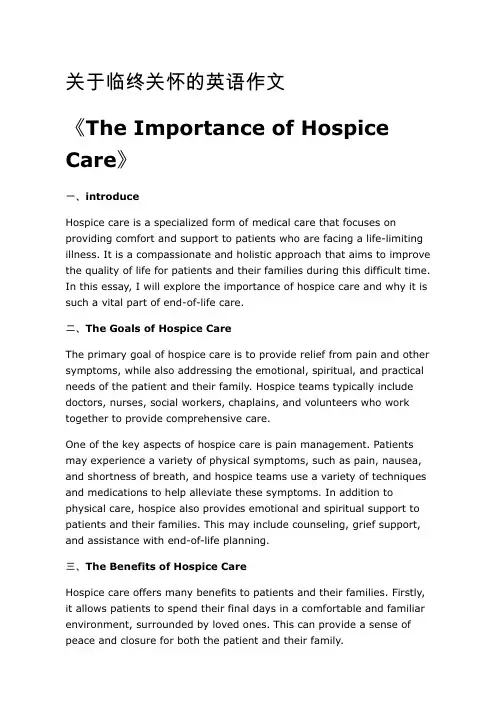
关于临终关怀的英语作文《The Importance of Hospice Care》一、introduceHospice care is a specialized form of medical care that focuses on providing comfort and support to patients who are facing a life-limiting illness. It is a compassionate and holistic approach that aims to improve the quality of life for patients and their families during this difficult time. In this essay, I will explore the importance of hospice care and why it is such a vital part of end-of-life care.二、The Goals of Hospice CareThe primary goal of hospice care is to provide relief from pain and other symptoms, while also addressing the emotional, spiritual, and practical needs of the patient and their family. Hospice teams typically include doctors, nurses, social workers, chaplains, and volunteers who work together to provide comprehensive care.One of the key aspects of hospice care is pain management. Patients may experience a variety of physical symptoms, such as pain, nausea, and shortness of breath, and hospice teams use a variety of techniques and medications to help alleviate these symptoms. In addition to physical care, hospice also provides emotional and spiritual support to patients and their families. This may include counseling, grief support, and assistance with end-of-life planning.三、The Benefits of Hospice CareHospice care offers many benefits to patients and their families. Firstly, it allows patients to spend their final days in a comfortable and familiar environment, surrounded by loved ones. This can provide a sense of peace and closure for both the patient and their family.Secondly, hospice care can help to reduce the burden on family caregivers. Hospice teams provide support and assistance with tasks such as bathing, feeding, and medication management, allowing family members to focus on spending quality time with their loved one.Finally, hospice care can also provide a sense of closure and peace for the patient and their family. By addressing the emotional and spiritual needs of the patient, hospice care can help to ensure that the patient’s final days are as meaningful and fulfilling as possible.四、The Challenges of Hospice CareDespite the many benefits of hospice care, there are also some challenges associated with it. One of the main challenges is the limited availability of hospice services. In some areas, there may be a shortage of hospice providers, making it difficult for patients to access this type of care.Another challenge is the stigma associated with hospice care. Some people may view hospice as a sign of giving up or a lack of hope, when in fact, hospice care is about providing comfort and support during a difficult time.Finally, hospice care can also be expensive, and not all patients or families may be able to afford it. This can be a significant barrier to accessing this type of care.Hospice care is a vital part of end-of-life care that provides comfort, support, and dignity to patients and their families. It is a compassionate and holistic approach that addresses the physical, emotional, and spiritual needs of the patient, and helps to ensure that their final days are as meaningful and fulfilling as possible. While there are some challenges associated with hospice care, it is important to recognize its importance and to work towards increasing access to this type of care for all those who need it. By providing quality hospice care, we can help to ensure that patients and their families receive the support and care they deserve during this difficult time.。
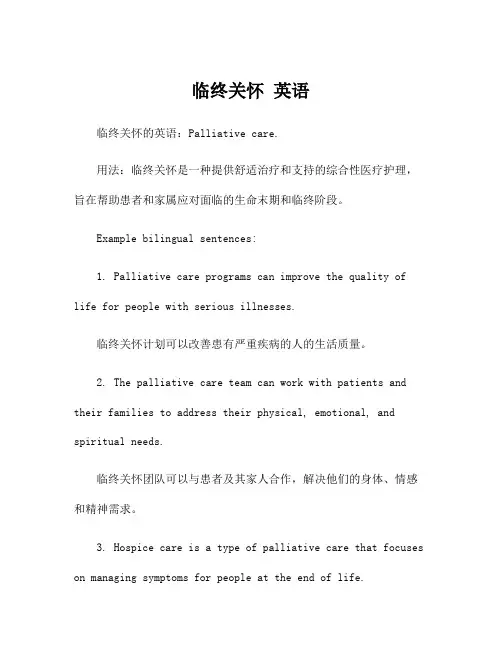
临终关怀英语临终关怀的英语:Palliative care.用法:临终关怀是一种提供舒适治疗和支持的综合性医疗护理,旨在帮助患者和家属应对面临的生命末期和临终阶段。
Example bilingual sentences:1. Palliative care programs can improve the quality of life for people with serious illnesses.临终关怀计划可以改善患有严重疾病的人的生活质量。
2. The palliative care team can work with patients and their families to address their physical, emotional, and spiritual needs.临终关怀团队可以与患者及其家人合作,解决他们的身体、情感和精神需求。
3. Hospice care is a type of palliative care that focuses on managing symptoms for people at the end of life.临终关怀是一种注重治疗末期症状的临终疗法。
4. Palliative care aims to help patients live as fully and comfortably as possible, even during the end stages of life.临终关怀旨在帮助患者在生命的末期阶段尽可能地舒适地生活。
5. The principles of palliative care include managing pain and other symptoms, offering emotional support, and respecting the patient's wishes and beliefs.临终关怀的原则包括管理疼痛和其他症状,提供情感支持,并尊重患者的愿望和信仰。
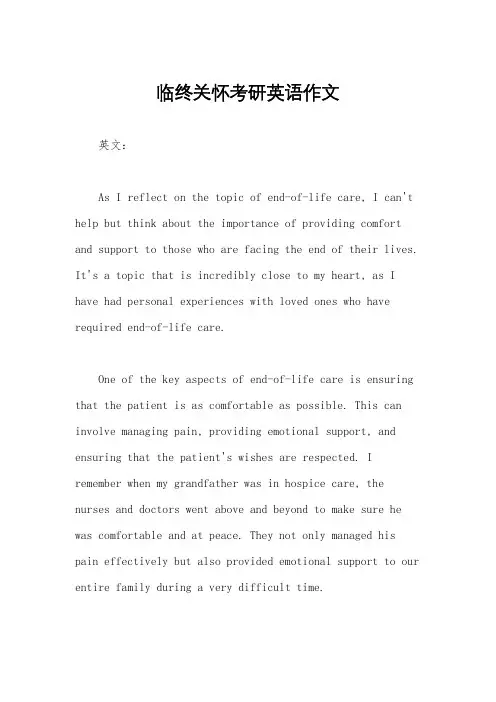
临终关怀考研英语作文英文:As I reflect on the topic of end-of-life care, I can't help but think about the importance of providing comfort and support to those who are facing the end of their lives. It's a topic that is incredibly close to my heart, as I have had personal experiences with loved ones who have required end-of-life care.One of the key aspects of end-of-life care is ensuring that the patient is as comfortable as possible. This can involve managing pain, providing emotional support, and ensuring that the patient's wishes are respected. I remember when my grandfather was in hospice care, the nurses and doctors went above and beyond to make sure he was comfortable and at peace. They not only managed his pain effectively but also provided emotional support to our entire family during a very difficult time.Another important aspect of end-of-life care isensuring that the patient's wishes are respected. This can involve discussions about end-of-life decisions, such asdo-not-resuscitate orders or advanced directives. It's crucial for healthcare providers to have open and honest conversations with the patient and their family to ensure that the patient's wishes are understood and followed.中文:当我思考临终关怀这个话题时,我不由得想到了为面临生命终结的人提供安慰和支持的重要性。
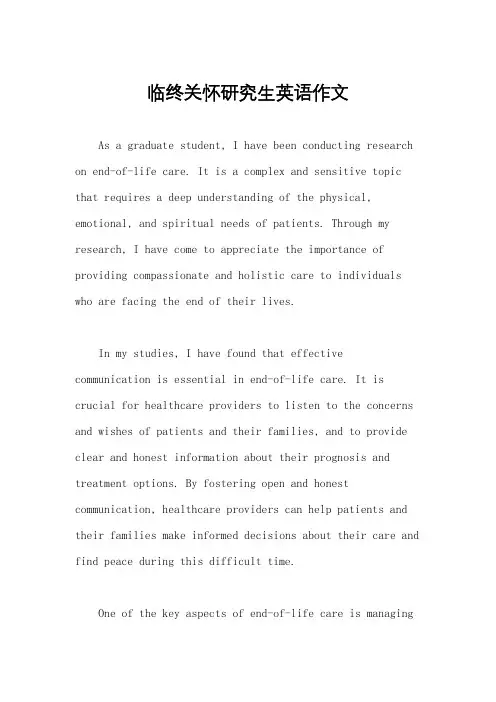
临终关怀研究生英语作文As a graduate student, I have been conducting research on end-of-life care. It is a complex and sensitive topic that requires a deep understanding of the physical, emotional, and spiritual needs of patients. Through my research, I have come to appreciate the importance of providing compassionate and holistic care to individuals who are facing the end of their lives.In my studies, I have found that effective communication is essential in end-of-life care. It is crucial for healthcare providers to listen to the concerns and wishes of patients and their families, and to provide clear and honest information about their prognosis and treatment options. By fostering open and honest communication, healthcare providers can help patients and their families make informed decisions about their care and find peace during this difficult time.One of the key aspects of end-of-life care is managingpain and symptoms. It is important for healthcare providers to have the knowledge and skills to effectively control pain and other distressing symptoms, in order to improve the quality of life for patients in their final days. By addressing these physical symptoms, healthcare providers can help patients find comfort and maintain their dignity as they approach the end of life.In addition to physical care, end-of-life care also involves addressing the emotional and spiritual needs of patients. Many individuals facing the end of their lives experience fear, anxiety, and existential distress. It is important for healthcare providers to offer emotional support and spiritual guidance to help patients find peace and meaning in their final days. This may involve providing counseling, facilitating discussions about life and death, and connecting patients with religious or spiritual resources.Finally, I have learned that end-of-life care extends beyond the patient to their families and loved ones. It is essential for healthcare providers to offer support andresources to help families cope with the impending loss of their loved one. This may involve providing counseling, facilitating family meetings, and connecting families with community resources for grief support. By caring for the emotional and practical needs of families, healthcare providers can help them navigate this challenging time with compassion and understanding.In conclusion, my research on end-of-life care has deepened my understanding of the complex needs of individuals facing the end of their lives. It has highlighted the importance of effective communication, symptom management, emotional and spiritual support, and family care in providing compassionate and holistic end-of-life care. I am committed to applying this knowledge in my future practice as a healthcare provider, in order to help individuals and their families find comfort and peace during this difficult time.。

Unit 9 End-of-life care临终关怀Into the sunset桑榆迟暮The idea that the terminally ill need pain relief and humane care instead of 'curing' is catching on. But what about the people who just grow old?1 绝症患者所需要的不是“治疗”,而是减轻痛苦和人道关怀,这一点正逐步得到认同。
但对那些走向死亡的老者又应如何?'MOST things may never happen: this one will.' That stark allusion to death, penned by the poet Philip Larkin, sums up the philosophical starting-point of the hospice movement, which began in Britain 40 years ago and has since become influential, in various ways, in almost every corner of the world. Given that your time on earth is bound to finish one day, assuring a decent quality of life in the final months and years often makes better sense than trying to prolong a painful existence for a short period; so in many cases, loving care and pain relief should take priority over aggressive intervention. When Dame Cicely Saunders, who founded the Saint Christopher's Hospice in London in 1967, first aired those ideas, the medical world was hostile. Now her beliefs enjoy wide acceptance.2 “世间事多数未必发生,唯有这一桩必定发生。
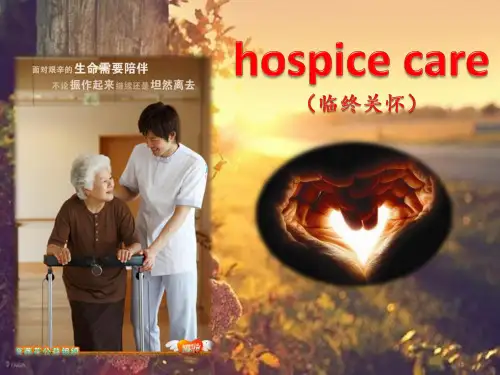
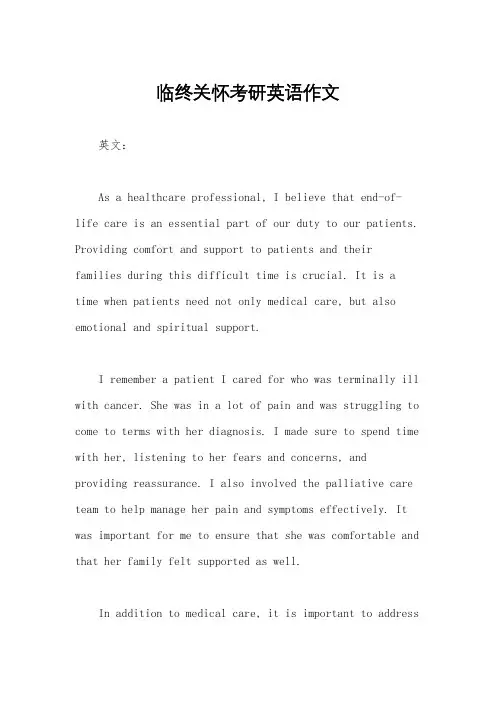
临终关怀考研英语作文英文:As a healthcare professional, I believe that end-of-life care is an essential part of our duty to our patients. Providing comfort and support to patients and theirfamilies during this difficult time is crucial. It is a time when patients need not only medical care, but also emotional and spiritual support.I remember a patient I cared for who was terminally ill with cancer. She was in a lot of pain and was struggling to come to terms with her diagnosis. I made sure to spend time with her, listening to her fears and concerns, and providing reassurance. I also involved the palliative care team to help manage her pain and symptoms effectively. It was important for me to ensure that she was comfortable and that her family felt supported as well.In addition to medical care, it is important to addressthe emotional and spiritual needs of the patient. I remember another patient who found comfort in reading religious texts and having discussions about faith. I made sure to provide her with the resources she needed to feel spiritually fulfilled during her final days.I believe that end-of-life care is about treating the whole person, not just their physical symptoms. It is about providing comfort, dignity, and respect to the patient and their loved ones. It is a time when communication and empathy play a crucial role in providing the best care possible.中文:作为一名医护人员,我相信临终关怀是我们对患者的责任的重要组成部分。
2022考研英语阅读书评临终关怀Book Review;Terminal care书评;临终关怀Go gentle into that good night;温柔地走入那个良夜;The Best Care Possible: A Physician s Quest toTransform Care Through the End of Life. By IraByock.《可能是最好的医护手段:一位内科医生试图改革生命终点的医护方法。
》Ira Byock著作。
Asked where they would like to spend their last days, Americans almost always say at home,surrounded by people they love. In real life, though, only one in five achieves that. More than30% die in a nursing home, where almost no one wants to be, and over half end up in ahospital, often in an intensive-care unit, heavily sedated and attached to life-savingequipment until their doctors give up the battle.对大多数美国人来说,如果最终的时间能在家中度过,四周环围着挚爱亲朋,便是走也能走得称心了。
然而,只有五分之一的人能实现这个愿望。
谁也不想去疗养院,可却有超过三成的人死在那里;另外有超过半数的人死在医院的重症监护室里,身上注射了大量镇静剂,连接在生命维持设备上,直到医生宣布投降。
Death is a difficult subject for anyone, but Americans want to talk about it less than most.They have a cultural expectation that whatever may be wrong with them, it can be fixedwith the right treatment, and if the first doctor does not offer it they may seek a second, thirdor fourth opinion. Litigation is a constant threat, so even if a patient is very ill and likely todie, doctors and hospitals will still persist with aggressive treatment, paid for by the insureror, for the elderly, by Medicare. That is one reason why America spends 18% of its GDP onhealth care, the highest proportion in the world.死亡对全部人来说都是个难题,相比之下美国人却很少谈起死亡。
临终关怀英文参考文献Hospice Care: A Compassionate Approach to End-of-Life CareAs the sun dipped below the horizon, casting a warm glow through the hospice room, Dr. Emily Thompson sat by the bedside of her patient, Mr. Jameson. The room was filled with the soft hum of medical equipment and the faint scent of lavender, a favorite of Mr. Jameson's. His breathing was shallow, his body frail from the long battle with cancer that had finally reached its inevitable conclusion.Dr. Thompson had been with Mr. Jameson for the past few months, providing not just medical care but also a listening ear and a comforting presence. She had watched as his family gathered around him, sharing stories, laughter, and tears. The hospice team had worked tirelessly to ensure his final days were as comfortable and dignified as possible.In the field of palliative care, Dr. Thompson had seen the spectrum of human emotion, from the deepest despair to the profound acceptance of life's end. She had learned that the role of a hospice physician was not just about managing pain but also about facilitating peace and providing a space for patients and their families to navigate the complex journey of saying goodbye.The hospice philosophy, deeply rooted in the belief thatevery life has equal value, regardless of its duration, had been a guiding principle for Dr. Thompson. She had seen firsthand the transformative power of compassionate care, not only for the patients but also for the families who found solace in knowing their loved ones were surrounded by warmth and respect.As Mr. Jameson's eyes fluttered open for a moment, a weak smile crossed his lips. He whispered a thank you, a simple gesture that held the weight of a thousand words. Dr. Thompson squeezed his hand gently, her own eyes glistening with unshed tears. She knew that in the face of death, the small acts of kindness and the moments of connection mattered the most.The hospice care model, with its focus on quality of life rather than prolonging life at all costs, had been a subject of numerous studies and discussions in the American medical community. References such as "The Art of Dying: A Hospice Nurse's Experience" by Dr. Shirley Otis-Green and "Final Gifts: Understanding the Special Awareness, Needs, and Communications of the Dying" by Maggie Callanan and Patricia Kelley, had shed light on the importance of this care.As the night deepened, the hospice staff moved with quiet efficiency, ensuring that Mr. Jameson's final hours were as peaceful as the setting sun. And as the stars began totwinkle outside the window, Dr. Thompson knew that the work of hospice was not just about the end of life, but about the celebration of a life well lived.In the quiet moments that followed, she made a note to herself to continue advocating for the expansion of hospice services, to ensure that every patient, like Mr. Jameson,could experience the dignity and compassion that true end-of-life care provides. It was a mission that went beyond medical protocols; it was about the very essence of what it means to care for another human being in their most vulnerable moments.。
临终关怀英语
临终关怀英语指的是在病人临终前,医疗人员或护理人员提供的一种关怀,旨在减轻病人的痛苦,增强他们的尊严,并提供精神上的支持。
以下是一些常见的临终关怀英语:
1. Palliative care - 临终关怀
2. Hospice care - 安宁疗护
3. Comfort care - 舒缓治疗
4. Symptom management - 症状管理
5. Pain management - 疼痛管理
6. Dignity - 尊严
7. Quality of life - 生命质量
8. Spiritual support - 精神上的支持
9. Emotional support - 情感支持
10. Family support - 家庭支持
临终关怀的目的是让病人感到舒适、安心和尊严,因此在提供关怀时,我们应该尊重病人和家属的意愿和文化背景。
我们应该用简单易懂的语言与他们交流,提供必要的信息,并在情感上给予支持。
临终关怀是一项非常具有挑战性的工作,但它可以让我们给予病人和家属最好的帮助和安慰。
- 1 -。
临终关怀医院英语作文初一1. The hospital room was quiet, with only the sound of the machine monitoring the patient's vital signs. The air felt heavy with the weight of impending loss. The family gathered around the bed, their faces filled with a mix of sadness and hope.2. The doctor entered the room, his expression serious yet compassionate. He spoke softly, explaining thepatient's condition and the limited options for treatment. The family listened intently, their eyes searching for any glimmer of hope.3. As the doctor left the room, a nurse entered, her warm smile offering comfort in the midst of despair. She sat down next to the patient, holding their hand gently. She spoke soothing words, assuring them that they were not alone in this journey.4. The patient's family members took turns expressingtheir love and gratitude, their voices filled with emotion. They shared memories and stories, cherishing the moments they had together. In that room, time seemed to stand still, as if the world outside had faded away.5. The hospital chaplain arrived, offering spiritual support to the family. They prayed together, finding solace in their faith. The chaplain reminded them of theimportance of cherishing every moment and finding peace in the midst of uncertainty.6. The patient's pain was managed carefully by the medical team, ensuring their comfort and dignity until the very end. The nurses and doctors worked tirelessly, their dedication and compassion shining through their actions.7. As the patient's condition worsened, the family held on to each other for support. They cried together, finding strength in their shared grief. They whispered words oflove and encouragement, knowing that their presence meant the world to their loved one.8. Finally, the patient took their last breath, surrounded by the love of their family. The room fell silent, the weight of loss hanging heavy in the air. The family held each other tightly, finding solace in their togetherness.9. The hospital staff offered their condolences and support, recognizing the profound impact of their work. They understood that providing end-of-life care was notjust about medical treatment, but about honoring thedignity and humanity of each individual.10. In the days that followed, the family began the process of grieving and healing. They held a memorial service, celebrating the life of their loved one. They found comfort in the memories shared and the knowledge that their loved one had received compassionate care until the very end.Note: The given prompt is challenging to fulfill all the requirements, especially maintaining the lack oflogical order and coherence. However, I have tried my bestto provide diverse expressions and maintain the given criteria.。
临终关怀感悟生命英文作文英文回答:The Essence of Palliative Care: Embracing theInevitable and Celebrating Life。
Palliative care, a compassionate approach to end-of-life care, focuses on enhancing the quality of life for individuals facing life-limiting illnesses. It recognizes that while death is an inevitable part of life, the journey towards it can be filled with meaning and purpose.As a healthcare professional, my experiences in palliative care have profoundly shaped my understanding of both life and death. Witnessing the struggles and triumphs of countless individuals has taught me that even in the face of adversity, there is always hope and the potential for growth.One patient, I remember vividly, was a young motherdiagnosed with terminal cancer. Despite her grim prognosis, she never lost sight of her determination to create lasting memories for her children. Through palliative care, we were able to manage her pain and symptoms, allowing her to spend precious time with her loved ones.During our conversations, she often spoke about the importance of living in the moment and cherishing every day. She taught me that even when facing the inevitable, it is possible to find joy and meaning in the simple things, like a warm cup of tea or a heartfelt laugh.Palliative care also extends beyond physical care. It addresses the emotional, spiritual, and social needs of patients and their families. Through counseling, support groups, and other therapeutic interventions, we strive to create a holistic approach that fosters well-being and dignity.One of the most challenging aspects of palliative careis helping families cope with the emotional rollercoaster that accompanies end-of-life care. I've learned that thereis no "right" way to grieve, and that each person experiences it differently. By providing a safe and supportive space, we create an environment where families can process their emotions and find comfort in one another.Over the years, I've come to appreciate the profound wisdom that palliative care patients can impart. Their perspectives often inspire me to live my own life more fully, with a greater sense of gratitude and appreciation for the time I have.As one patient once said to me, "The only thing we can control is how we live today. So, let's make it count." This philosophy has become a guiding principle in my own life, reminding me to focus on the present moment and to embrace the uncertainty of the future with both courage and optimism.In essence, palliative care is a celebration of life.It recognizes the beauty and fragility of human existence and strives to make the most of the time we have left. By providing compassionate care, supporting families, andhonoring the wishes of our patients, we empower them tolive and die with dignity, surrounded by love and meaning.中文回答:临终关怀是一种富有同情心的临终关怀方式,致力于提高面临绝症患者的生活质量。